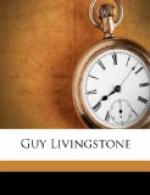Before long De Rosny returned. The preliminaries were soon arranged. Pistols were necessarily to be the weapons, for Levinge had seldom touched a foil; and, as the Frenchman said with a bow that made his objection a compliment, “Colonel Mohun’s reputation as a swordsman was European.” An early hour next morning was fixed for the venue, in the Pre aux Clercs of the nineteenth century—the Bois de Boulogne.
When they were alone again Guy turned gravely to his companion. “It is a bad business, I fear, though you could not have acted otherwise; but I would rather your adversary were any other than Levinge. It is a murderous, unscrupulous scoundrel as ever lived. He can shoot—that’s nothing; so can you, better than most men—but, mark me, Ralph, he has been out twice, and hit his man each time, the last mortally; but on neither occasion was his fire returned. Men say he has an awkward knack of pulling the trigger half a second too soon. I don’t know if this is true, but I do know that Seymour, who seconded him at Florence when he killed O’Neill, has been more than cool to him ever since.”
“Faith, I can well believe it,” Mohun answered, quietly, “and it is very probable I may get hard hit to-morrow; but of killing him I feel morally certain. Do you believe in presentiments? I do. Before that drunken brute had half done speaking, I saw imminent death written in his face as plainly as if I had possessed the Highland second-sight. I think I could almost tell you how it will look after my shot. Well, we must talk of business. My arrangements won’t take me long. I have very little to dispose of; it is almost all entailed property. I shall leave you the choice of any thing among my goods and chattels. You will find some arms that you may fancy. But if my pistols fail me to-morrow, so that Levinge lives over it, do me the favor to throw them into the Seine; they deserve nothing better. As for the ready-money I have with me, and some more at my banker’s—” he hesitated, and then went on in a gentler voice, “I should like it to go to that poor child whom we met to-night. If I live I will take care she is settled in England, where some one will be kind to her. Her father was a good soldier and a true-hearted gentleman. And, Guy, I am sorry that I sneered at you to-night; I hardly meant it when I said it.”
This was a great concession from Mohun, and his hearer thought so as he wrung his hand hard and replied,
“Don’t think of that again. I did you justice an hour ago.”
There was this peculiarity about Ralph; he was not only insensible to danger, like other men, but he absolutely seemed to revel in it. The genial side of his character came out at the approach of deadly peril, just as some morose natures will soften and brighten temporarily under the influence of strong wine.
His mood seemed to change, however, suddenly; and when, after a long pause, he spoke again, it was in a low, broken voice, as if to himself.




